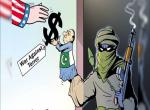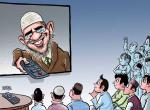A small island of shopkeepers dominated the largest part of the world for the longest period with Genghis Khan, the brute, being a distant runner-up. The two, separated by several centuries, had nothing in common except their genius for innovation.
More by instinct than design, they worked on the twin doctrines that if anything goes wrong, something must change and for the change to be real it must reach the edge which cuts. The British refined it to a fine drill — senior officers going into minute details when systems failed, improving them through innovative ideas, and building capacities by training, motivating or forcing people below to change.
This made systemic improvements an evolutionary process — not something which awaited committees to recommend when things go beyond redemption. And this is precisely where we have failed in management of internal security, in general, and handling of terrorism, in particular. India, which has witnesses over 70,000 deaths by the hands of terrorists, should have changed its security systems.
A country, which in the hands of terrorists witnessed over 70,000 deaths, where nearly 11,000 security personnel — more than in all the wars fought by it — have been killed by terrorists, where half a million people continue to remain as refugees in their own country for over a decade and a half, and where over 24,500 foreign mercenaries have come to bleed India should have changed its security systems and apparatus unrecognizably.
What is tragic is not what has happened but the fact that, barring some cosmetic changes, we continue to be governed by the same laws, same change-resisting bureaucratic procedures, same misplaced priorities where internal security is a low priority item in the budget, same selection procedures laced by corruption and caste politics, and same training which was designed to keep colonial masters in power. We take the losses in our stride—nobody's blood boils, no one's conscience is pricked and nothing changes.
US faced one lethal strike and everything changed overnight - their laws, instrumentality to fight terrorism -- brand new Department of Homeland Security surfacing from nowhere, their foreign policy, immigration processes and access control, intelligence transformation just to name a few. Not that their system is perfect but it shows their capacity to change fast and take the changes to the operating levels. No wonder September 11 was not repeated. The secret of success lies in lowering our tolerance threshold for all that which fails to deliver, changing fast and constantly, and taking the changes to the last beat constable on the road.
The worst is yet to come. What is happening all around us in Pakistan, Afghanistan, Bangladesh and Nepal and more importantly within have grave security implications and is indicative of extremely testing times. Taking changes to micro levels is a very time consuming and painstaking effort, particularly for a huge and diverse internal security apparatus like India's, involving nearly twenty million people. The time to act is here and now. Let the doctrine of time-tested methods be relegated to the dustbin of history -- it is only supported by those who have either a vested interest in status quo or a deep sense of insecurity emanating from incompetence.
An attempt was made in 2001, for the first time after Independence, to bring about an integrated transformation in national security apparatus and systems encompassing internal security, intelligence, border management and defence. The first three of them had direct relevance to the fight against terrorism. With the passage of time, much of the enthusiasm for change has withered away. The Prevention of Terrorism Act (POTA) stands repealed and the recommendations of the Malimath Commission suggesting overhaul of judicial administrative system shelved. The entire legal and judicial framework under which terrorism should be tackled needs to be revisited and a national consensus built to make it compatible with the level of threat, existing and potential. Politicizing the matter is against national interest.
A multipurpose national identity card scheme, after amendments in Citizenship Act 1955 in December, 2003 was pressed into action and a pilot project launched. It envisaged providing national identity cards to all above the age of 16 and link it to birth details, school records, passport details, property holdings, driving license, foreign travels besides finger prints and bio-metric recognitions etc. Its opposition by some sections for reasons other than best national interest is understandable though not acceptable, but the government wilting under their pressure and practically showing no progress in three years is unforgivable. It could have provided instant recognition capabilities and a data bank, so desperately required to fight terrorism.
Fight against terrorism is essentially a foot soldiers’ battle and not a generals’ one. It requires training, equipping, empowering, motivating and coordinating people at the cutting edge levels. A counter-terrorist operation rarely requires planning, resource mobilisation and tactics involving large bodies of men and material. Unfortunately, not much has been done to improve the skills, knowledge, moral and operational proficiency at that level. Real improvement in training requires a state of art R&D back up involving research in tactics, communications, control and command systems, target zeroing, reconnaissance and intelligence gathering, procurement, storage and distribution of weapons, operation of financial channels etc, just to mention few.
Unless a dedicated R&D team constantly works on analysing each event, examining the seized documents, interrogating the terrorists, case studying failed and successful operations training is an eye wash. It's a pity that nearly 90 per cent of those who are deployed on counter-terrorist tasks have not even undergone this ritual—non-availability of funds and training facilities cited as the primary cause. Even the Centre has limited capacities to impart such training while the plight of the States is pathetic. The infirmity must be cured under a time bound programme, whatever the costs.
It is a fallacious presumption that in asymmetric warfare, the stronger nation has no option but to respond in a defensive mode. Defensive offence is necessary to increase the costs of the adversaries. A loud and clear message to those who would like to pursue the strategy of thousand cuts to bleed India, for furthering their politico-military objectives, has got to be given.
The complex network that webs global Islamic radicalism, proponents of Salafi ideology, terrorist outfits, gun runners, hawala racketeers, underworld mafias, currency counterfeiters, drug syndicates etc. should be seen as an organic whole and dealt under an integrated action plan. Degradation of one reduces the efficacy of others and vice versa.
Empowerment of center to take cognisance of these crimes, which impact national security, is an absolute necessity.
The magic word is change -- positive, fast and reaching out to the lowest on the ladder. This, however, will require a political will. Do we have it?
The author is a former chief of the Intelligence Bureau
Published in HindustanTimes dated : September 15, 2007









Post new comment